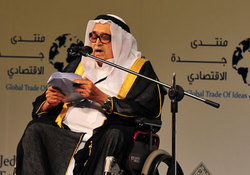Sudan Tribune | 9 April 2012

Khartoum — A prominent Saudi businessman announced last week that the Sudanese government agreed to give his country two million acres [809 371 hectares] of land as a farming investment that would allow the Arab Gulf state to ensure safe and steady food supply.
The chairman of the Jeddah Chamber of Commerce Saleh Kamel told the Saudi-based al-Sharq newspaper that the project, if successful, may allow Riyadh to achieve a food surplus that can be exported elsewhere.
Kamel disclosed that the Khartoum will make the farmland a free zone that is not subject to any form of taxation or duties and is not covered by Sudanese laws.
The world's largest oil exporter would no longer need to import food from Argentina, North America and Australia when the plantation scheme becomes fully operational, he added.
Since the 2007-2008 global food crisis, Saudi Arabia has been encouraging private and public firms to invest in farm projects abroad. In 2008, the government there also abandoned a 30-year self-sufficiency in wheat programme.
Saudi Arabia wants build stocks of basic commodities such as wheat, rice, oil and sugar to avoid the implications of rising global food prices and also to meet the needs of the population that is growing at a rapid pace.
The government-owned Saudi Industrial Development Fund (SIDF) offers credit guarantees to companies wishing to invest in farming projects abroad.
Kamel explained the choice of East Sudan for launching the project is due to its proximity to Port Sudan which allows the products to be easily shipped to Saudi Arabia just across the Red Sea. He said that he would discuss the matter with the Saudi ministers of agriculture and finance.
"The return [on investment] of agriculture in Sudan will reach 15% of the capital in the first year, a return that is more than good and better than investing in any another business sector" he said.
It remains to be seen whether the Saudi farming venture will be successful. Saudi businessmen, including Kamel, have complained in the past that investing in Sudan faces too many hurdles.

Sheikh Saleh Kamel, the founder of the Dalla Al Barakah Group and Chairman of the Islamic Chamber of Commerce and Industry, says that the Sudanese government agreed to give Saudi Arabia two million acres [809 371 ha] of farmland in East Sudan for a project to produce food for export to Saudi Arabia
Khartoum — A prominent Saudi businessman announced last week that the Sudanese government agreed to give his country two million acres [809 371 hectares] of land as a farming investment that would allow the Arab Gulf state to ensure safe and steady food supply.
The chairman of the Jeddah Chamber of Commerce Saleh Kamel told the Saudi-based al-Sharq newspaper that the project, if successful, may allow Riyadh to achieve a food surplus that can be exported elsewhere.
Kamel disclosed that the Khartoum will make the farmland a free zone that is not subject to any form of taxation or duties and is not covered by Sudanese laws.
The world's largest oil exporter would no longer need to import food from Argentina, North America and Australia when the plantation scheme becomes fully operational, he added.
Since the 2007-2008 global food crisis, Saudi Arabia has been encouraging private and public firms to invest in farm projects abroad. In 2008, the government there also abandoned a 30-year self-sufficiency in wheat programme.
Saudi Arabia wants build stocks of basic commodities such as wheat, rice, oil and sugar to avoid the implications of rising global food prices and also to meet the needs of the population that is growing at a rapid pace.
The government-owned Saudi Industrial Development Fund (SIDF) offers credit guarantees to companies wishing to invest in farming projects abroad.
Kamel explained the choice of East Sudan for launching the project is due to its proximity to Port Sudan which allows the products to be easily shipped to Saudi Arabia just across the Red Sea. He said that he would discuss the matter with the Saudi ministers of agriculture and finance.
"The return [on investment] of agriculture in Sudan will reach 15% of the capital in the first year, a return that is more than good and better than investing in any another business sector" he said.
It remains to be seen whether the Saudi farming venture will be successful. Saudi businessmen, including Kamel, have complained in the past that investing in Sudan faces too many hurdles.












